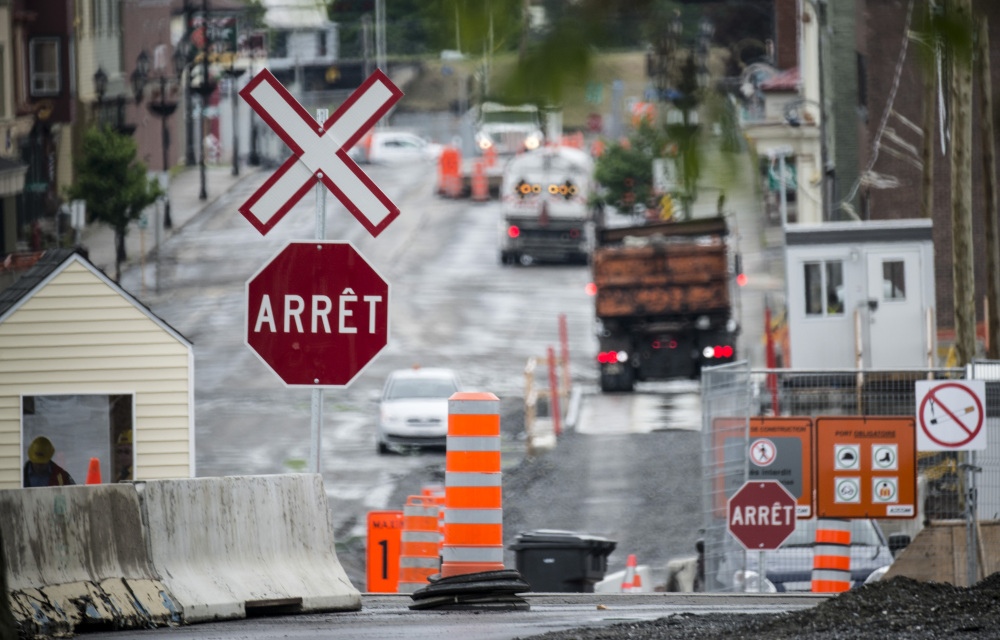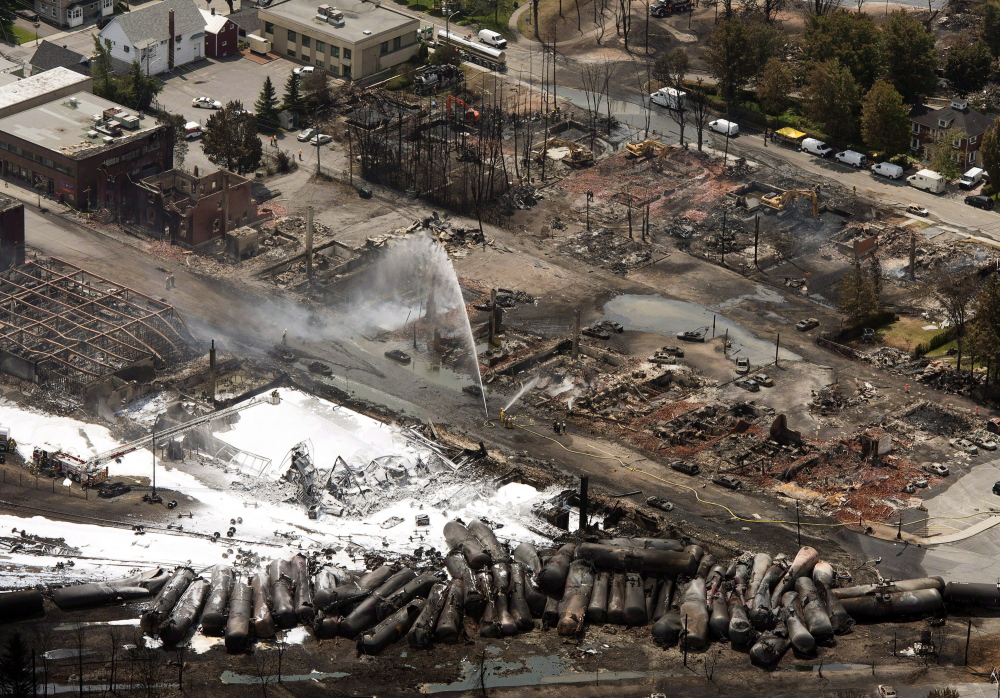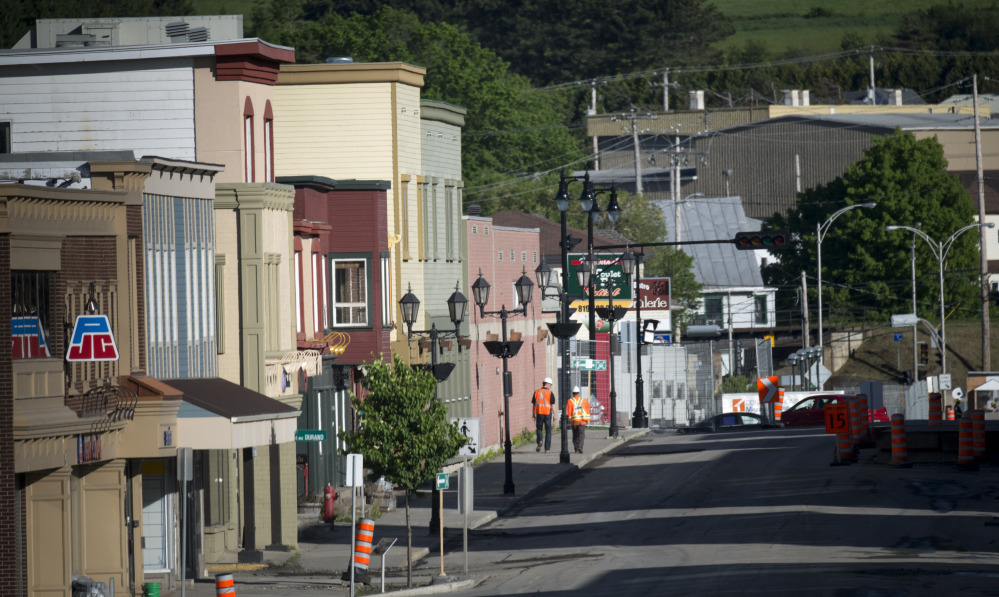LAC-MEGANTIC, Quebec – Backhoes and bulldozers are still digging out oil-seeped soil and pavement in the center of this lakeside Quebec town. Where the post office, public library and restaurants once stood, there is only the clanging of machinery kicking up dust over the emptiness.
It is the daily soundtrack of a town fighting to rise up from one of the worst railway disasters in North American history.
A year has passed since a runaway oil train slid quietly down a hill in the middle of the night and derailed in a series of explosions that obliterated a large swath of downtown Lac-Megantic, killing 47 people. Paved roads and new buildings remain a long way off in the fenced-off disaster zone. The damage to the surrounding river system hasn’t been fully made public, and the environmental cleanup alone will cost at least $200 million.
Upsetting many townspeople, oil trains could soon rumble through the town again.
“It’s a challenge for us to commemorate something that doesn’t yet belong to the past,” said Father Steve Lemay, the parish priest at St. Agnes Church, a stone building overlooking the disaster site. “We’re still in the midst of the tragedy.”
This weekend, the town of 6,000 people will mark the anniversary of the July 6, 2013, accident that prompted Canada and the U.S. to tighten regulations and phase out old tanker models. There will be special Roman Catholic masses, a 47-minute candlelight walk and the unveiling of a monument etched with the names of those killed.
Many townspeople aren’t ready for it.
“I’m sure the images of those final hours will come back, all those flames,” said Yannick Gagne, owner of a popular bar where an estimated 30 people were killed.
Just outside the clean-up zone, Gagne is building a new bar. Musi-Cafe had been the heart of the town’s nightlife, with its two-dozen beers on tap and cozy, wood-paneled decor inside a red-brick building that Gagne had bought and renovated four years ago.
His determination to open a new bar just feet from his old one has become a symbol of hope. Yet Gagne says he struggles every day with grief and anger, haunted by thoughts of the last moments of his friends and employees. Gagne had left the bar just 45 minutes before the train slammed into it in the early hours of that Saturday. He had just treated a group of friends to a round of drinks. They were all killed, along with three of his bartenders, the members of the band playing that night and the tenants who lived upstairs.
“I do that every day – think of all the people I’ve lost,” said Gagne, a 35-year-old father of three with a sturdy build and chin-strap beard, now known throughout Canada.
Gagne hopes the new Musi-Cafe – a more modern construction with floor-to-ceiling glass windows – will open in September at the end of a new main street, hastily built by the government. Insurance is covering some of the estimated $1.6 million cost of the bar and a construction company, BONE Structure, has also contributed. But Gagne said funding expected from the Quebec government has not arrived, delaying the project. For now, his half-built patio overlooks the rumble of the disaster zone.
Other new storefronts remain empty. Tenants like Alex Lapointe, who lost his Italian restaurant in the accident, complain that bureaucratic delays are tying up compensation payments.
Just $25 million in insurance payouts have been made available for wrongful death, personal injury, property damage, fire suppression and environmental impact. But with the completion of the sale of the bankrupt railroad responsible for the accident, attention is turning to the creation of a settlement fund with hundreds of millions of dollars. The Quebec government is footing the bill for the cleanup but has submitted claims against the defunct railroad at the heart of the disaster, Montreal Maine and Atlantic, as well as Irving Oil, the company that was going to refine the oil being transported.
Life is returning fitfully. An ice cream shop has emerged as a new gathering place, even if “it lacks a little character,” said longtime resident Louise Tardif. Claude Grenier, a photographer who lost his office in the accident, opened a gallery across the street from the fenced off area. At his opening, Grenier displayed photographs of the downtown before it was erased. One showed a group playing hockey on an iced-over stretch of the main road, a winter tradition.
“The downtown had so much energy,” said Grenier. “I never considered moving. This is where I want to live.”
In May at the town courthouse, three railway employees were charged with 47 counts each of criminal negligence, including engineer Thomas Harding, who is accused of failing to set enough brakes on the train. The men are set to appear in court in September. Montreal, Maine and Atlantic Railway was also charged.
Trains, which provide a crucial link for many businesses in the town’s industrial park, already began transporting non-hazardous materials last December.
John Giles, president and CEO of Central Maine and Quebec Railway, which bought the defunct company, told The Associated Press in May he plans improve the rail lines over the next two years with a goal of resuming oil shipments in 18 months.
The announcement angered many in Lac-Megantic. City officials are pushing for the company, along with the federal and provincial governments, to foot the bill for a new track that would circumvent the downtown.
“We’re working really hard to have a detour so that it doesn’t go through town,” said Jean-Guy Bouffard, a town councilor. “That’s what residents want – but we also need a train for industry.”
Giles has not commented publicly on the idea of a new track. But he now stresses that there are no concrete plans for oil shipments. In an e-mail to AP this week, Giles said that for the moment, he has “no plans to ship crude, and no one has approached us to handle crude.”
A spokesman for the federal government’s Transport Minister said the decision is up to the city and railroad company.
“It would be very disappointing and shocking,” Gagne said of the prospect of oil being transported through town. “If they say, ‘we will clean up the whole thing, fix the town, and promise to only go 5 miles an hour, then maybe.”‘
In a town so small, the disaster touched nearly everyone personally. Mayor Colette Roy Laroche lost two cousins. Lemay, the priest, presided over almost all the funerals, one by one, as the remains of the victims were identified.
“I haven’t tried to count them, because it was so difficult,” Lemay said. “But I know that I did most of them.”
Among those who died in Musi-Cafe was Genevieve Breton, a 28-year-old competitor on Quebec’s American Idol-like TV reality show “Star Academie.” She had been on the verge of putting out her first album when she was killed. Her parents recently released one in her memory.
“It wasn’t easy, we had to listen to her songs for days and weeks to put it together,” said Genevieve’s mother, Ginette Cameron. “We were lucky, though. At least she left us her voice.”
Send questions/comments to the editors.




